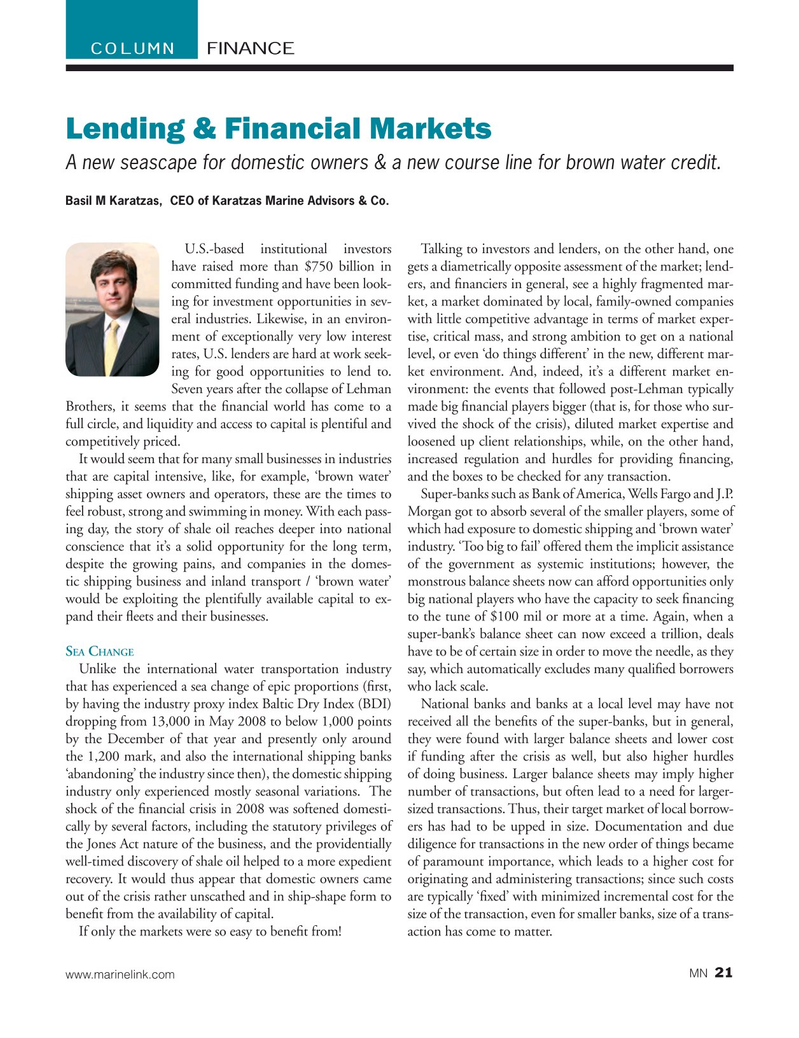
Page 21: of Marine News Magazine (September 2015)
Inland Waterways
Read this page in Pdf, Flash or Html5 edition of September 2015 Marine News Magazine
COLUMN FINANCE
Lending & Financial Markets
A new seascape for domestic owners & a new course line for brown water credit.
Basil M Karatzas, CEO of Karatzas Marine Advisors & Co.
U.S.-based institutional investors Talking to investors and lenders, on the other hand, one have raised more than $750 billion in gets a diametrically opposite assessment of the market; lend- committed funding and have been look- ers, and ? nanciers in general, see a highly fragmented mar- ing for investment opportunities in sev- ket, a market dominated by local, family-owned companies eral industries. Likewise, in an environ- with little competitive advantage in terms of market exper- ment of exceptionally very low interest tise, critical mass, and strong ambition to get on a national rates, U.S. lenders are hard at work seek- level, or even ‘do things different’ in the new, different mar- ing for good opportunities to lend to. ket environment. And, indeed, it’s a different market en-
Seven years after the collapse of Lehman vironment: the events that followed post-Lehman typically
Brothers, it seems that the ? nancial world has come to a made big ? nancial players bigger (that is, for those who sur- full circle, and liquidity and access to capital is plentiful and vived the shock of the crisis), diluted market expertise and competitively priced. loosened up client relationships, while, on the other hand,
It would seem that for many small businesses in industries increased regulation and hurdles for providing ? nancing, that are capital intensive, like, for example, ‘brown water’ and the boxes to be checked for any transaction. shipping asset owners and operators, these are the times to Super-banks such as Bank of America, Wells Fargo and J.P. feel robust, strong and swimming in money. With each pass- Morgan got to absorb several of the smaller players, some of ing day, the story of shale oil reaches deeper into national which had exposure to domestic shipping and ‘brown water’ conscience that it’s a solid opportunity for the long term, industry. ‘Too big to fail’ offered them the implicit assistance despite the growing pains, and companies in the domes- of the government as systemic institutions; however, the tic shipping business and inland transport / ‘brown water’ monstrous balance sheets now can afford opportunities only would be exploiting the plentifully available capital to ex- big national players who have the capacity to seek ? nancing pand their ? eets and their businesses. to the tune of $100 mil or more at a time. Again, when a super-bank’s balance sheet can now exceed a trillion, deals
S C have to be of certain size in order to move the needle, as they
EA HANGE
Unlike the international water transportation industry say, which automatically excludes many quali? ed borrowers that has experienced a sea change of epic proportions (? rst, who lack scale.
by having the industry proxy index Baltic Dry Index (BDI) National banks and banks at a local level may have not dropping from 13,000 in May 2008 to below 1,000 points received all the bene? ts of the super-banks, but in general, by the December of that year and presently only around they were found with larger balance sheets and lower cost the 1,200 mark, and also the international shipping banks if funding after the crisis as well, but also higher hurdles ‘abandoning’ the industry since then), the domestic shipping of doing business. Larger balance sheets may imply higher industry only experienced mostly seasonal variations. The number of transactions, but often lead to a need for larger- shock of the ? nancial crisis in 2008 was softened domesti- sized transactions. Thus, their target market of local borrow- cally by several factors, including the statutory privileges of ers has had to be upped in size. Documentation and due the Jones Act nature of the business, and the providentially diligence for transactions in the new order of things became well-timed discovery of shale oil helped to a more expedient of paramount importance, which leads to a higher cost for recovery. It would thus appear that domestic owners came originating and administering transactions; since such costs out of the crisis rather unscathed and in ship-shape form to are typically ‘? xed’ with minimized incremental cost for the bene? t from the availability of capital. size of the transaction, even for smaller banks, size of a trans-
If only the markets were so easy to bene? t from! action has come to matter.
21
MN www.marinelink.com

 20
20

 22
22
